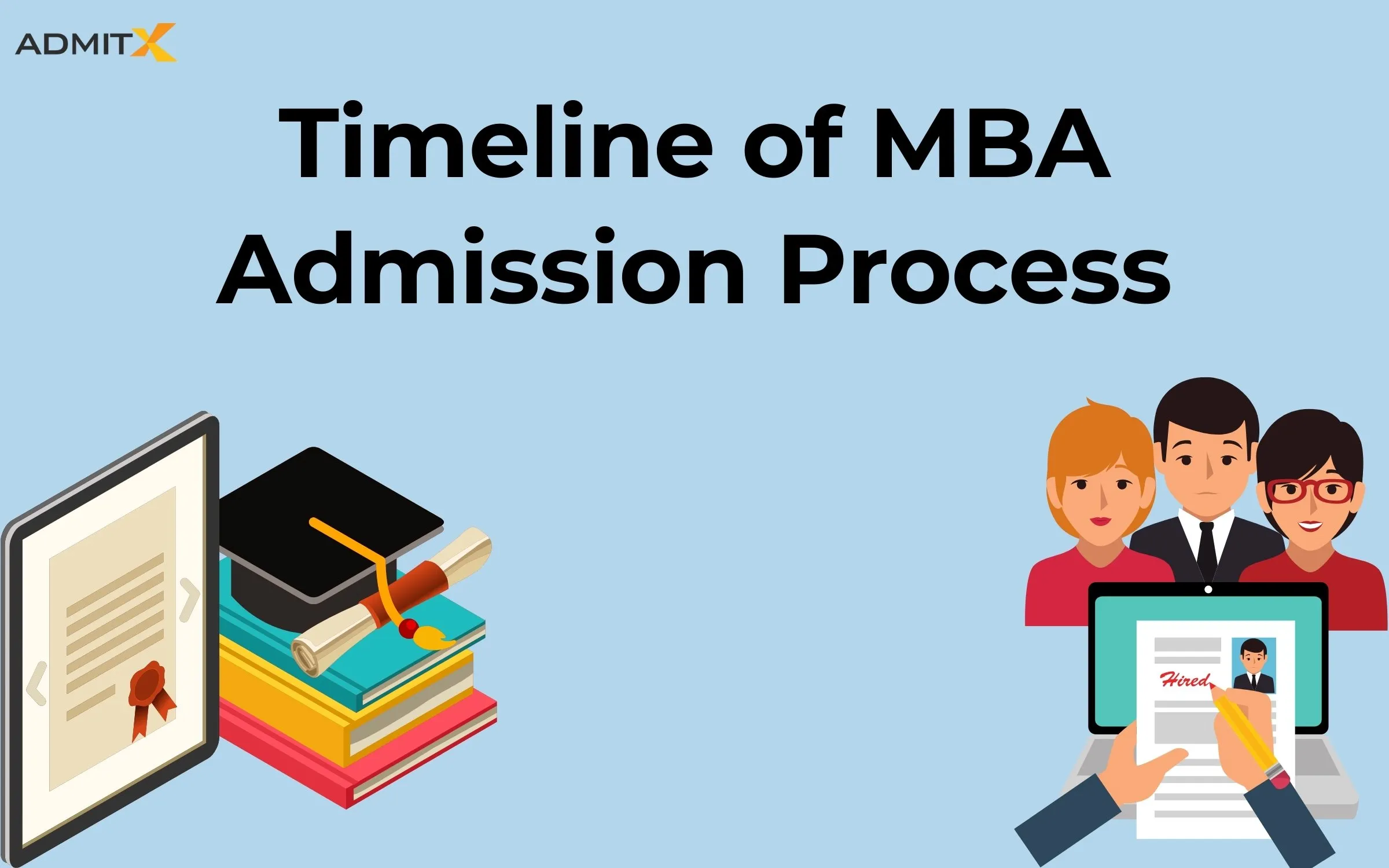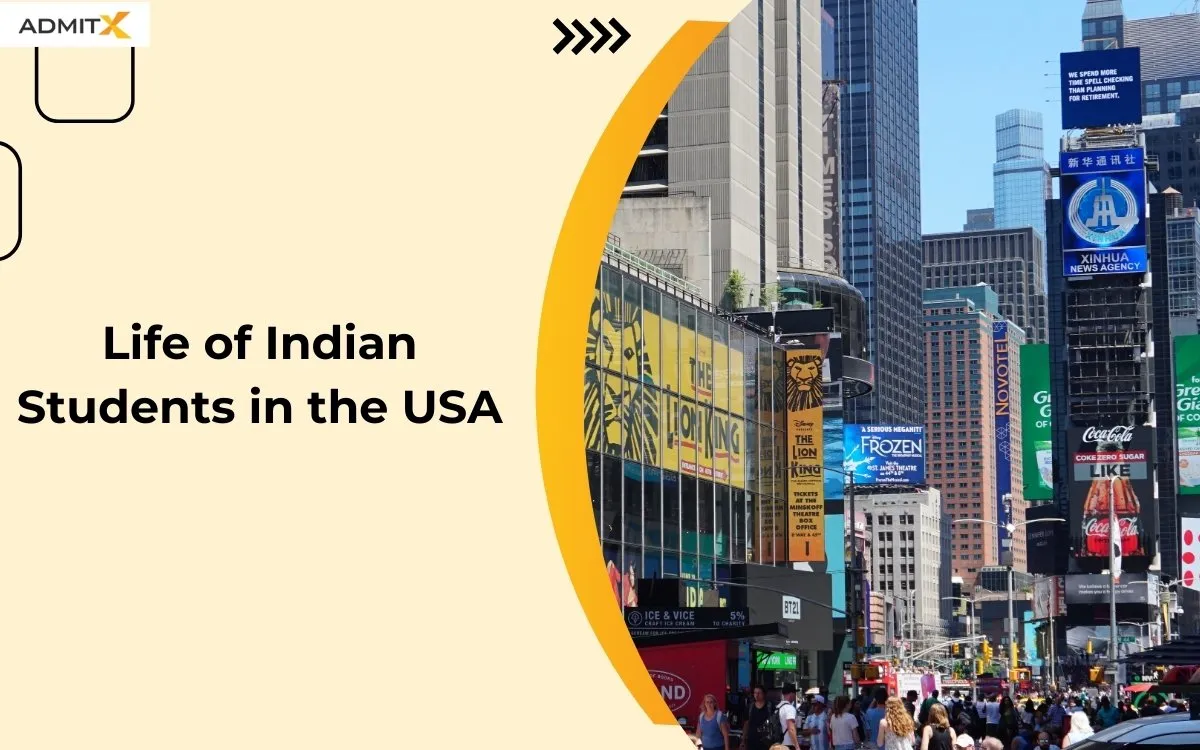
Timeline of MBA Admission Process for 2025-26
The MBA admission process is very lengthy and time-consuming. The exact processing times and deadlines vary depending on the college or university. MBA is among the most popular study programs; hence, each business school’s requirements might vary greatly. Still, the basic steps remain the same that we have discussed in this blog, such as the type of application process for an MBA program, the admission timeline, and the list of required documents.
MBA Admission Process: An Overview
MBA is a prestigious and professional post-graduate academic program that imparts knowledge of business and management. Every year, lakhs of Indian students apply for this program in various top B-schools worldwide. However, only a few thousands of candidates enter their dream colleges. High competency, limited seats, lack of proper approach, etc., can be some of the reasons that make competition tough. The admission process is lengthy and time-consuming; hence, it would require them to understand the whole process, including the admission timeline for crafting systemic planning.
Study Intakes in Top B-Schools for MBA
About 2000+ MBA programs are currently available in various specialisations worldwide. The MBA admission process, including timelines and other administrative processes for international students, varies greatly depending on the country, universities or colleges, intakes, etc. Most top B schools worldwide offer MBA admission in the fall intake, which usually commences in September, and very few universities do so in the spring and summer intake. So, preparing for MBA admission should begin accordingly, especially if students are looking for the fall intake.
| Study Intakes | Application duration (for 2025 year) | Start of Class |
|---|---|---|
| Fall (Sep-Dec) | October-January/February 2024 | September 2025 |
| Spring (Jan-May) | July-November 2024 | January 2025 |
| Summer (May-Aug) | November-January/February | May 2025 |
Also read – Ways to Fund your Overseas Education
MBA Admission Process: Types of Application Process
As discussed before, the admission process is a big task since it involves several steps, such as appearing in MBA entrance exams, researching top MBA colleges, arranging and submitting required documents, paying tuition fees, etc. Unlike other graduate programs, MBA has a complex enrollment process system for which appropriate strategy should be made. To understand this, we must know how the MBA application process is proceeded in various universities across the world, as we have described below:
Round-Based Admission:
- Various rounds are arranged in round-based enrollment, and the number of rounds may vary depending on the country and the institution.
- In countries like the USA, the UK, Australia, Canada, etc, the number of rounds is between 3 and 5. In contrast, in some European countries like France, institutes offer admission to MBA programs in 10 to 14 rounds until seats are occupied completely.
- In round-based admission, each round has significantly varied application deadlines, interview dates, and decision dates.
Rolling Admission:
- In rolling-based admission, no round is involved as the institute evaluates applications as they are received.
MBA Application Rounds: Features of Each Round
Before starting preparation for the MBA admission process, it is crucial to understand the fundamentals of the round-based admission process.
- As described above, in round-based admission, institutes generally offer admission to students in several phases, which might depend on the institute and the number of seats available.
- When the MBA application process begins in any institute, it marks round 1, in which universities claim to have a slightly higher acceptance rate than in other rounds, provided that they have fulfilled all eligibility criteria and requirements posed by specific colleges or universities.
- Also, admission to an MBA college in Rounds 1 & 2 increases the possibility of getting the best scholarship schemes and other academic advantages.
- When Round 1 concludes, other subsequent rounds are arranged. Rounds 2, 3, or other provide an enrollment opportunity to students who failed to get admission in the first or following rounds.
- The benefits or advantages students might get after getting MBA admission in the first round, they either receive less or no advantages for subsequent rounds.
- However, students cannot apply for more than one round in a particular college or university.
- For example, if you apply for London Business School in Round 1 but do not get admitted, you cannot apply for the same program in subsequent rounds and you have to apply again next year.
MBA Admission Process Timeline: How and When to Apply?
Below, we have described the timeline for admission into an MBA program. The students must focus on successfully completing the first round of the admission cycle since they are more likely to get admission into the best universities. This round also offers the best scholarship schemes that can help them afford their higher education. Keeping these points in mind, they must begin their preparation journey at least 1-1.5 years before the commencement of the application process.
Pre-Application Stage
1-1.5 Years Before Applying
- Assess and evaluate your strengths and weaknesses to learn more about yourself. This will also tell you whether you are the best fit for an MBA program.
- Focus on weaknesses and try to improve them by acknowledging them. Understand that no one is perfect, and only you have the power to change yourself.
- Learn about skills and competencies you would require to show after getting admission into a top B school.
- While pursuing an MBA program, consider developing unique qualities you want to share with the college and society. MBA colleges look for charismatic, unique personalities who can bring advantages.
7-10 Months Before Applying
- Research top B schools and investigate the academic credentials of other students, particularly alumni, to understand their potential and competency. This will help you in setting realistic goals.
- Compare various MBA programs with several colleges for which you have aspirations.
- Go through each piece of information carefully, including eligibility criteria, required documents, available scholarships, etc.
- Start preparing for MBA entrance exams such as GMAT and GRE and language proficiency tests such as IELTS, TOEFL, PTE, etc. Aim for a score at or above the required ones to crack the MBA entrance exams and other tests.
- Carefully choose recommenders and request recommendation letters from them. Give sufficient time to allow them to craft the content appropriately.
3-6 Months Before Applying
- Start drafting multiple essays and resumes and evaluate them appropriately to get a final one.
- Appear in the GMAT or GRE test and other language proficiency exams.
- Arrange all the required documents and take a final look before proceeding with the admission process.
Application Stage
September: 1st Round of Admission
- When you are ready and confident, start applying for the B schools on their respective websites by filling out all the required details, such as personal and academic ones.
- Submit the documents on their portal.
- MBA colleges extend interview invitations to selected applicants within a month of receiving the application.
- Those who do not receive interview invitations can usually expect to be rejected.
January: 2nd Round of Admission
- Prepare to apply for an MBA program in the second round, depending on whether your dream college accepts your application.
- Reflect on shortcomings that led to rejection in the first round and attempt to improve it.
- Apply to the university’s website by submitting all the required details and documents.
- If the application process gets rejected, consider applying to other B-schools in the subsequent rounds or wait for the next application cycle.
MBA Admission Process: Required Documents
Following is the list of required documents for the MBA application process:
- Previous academic certificates and transcripts from all previous educational institutions attended.
- Proof of professional experience
- Standardised language proficiency test scores such as TOEFL/IELTS/PTE.
- GMAT/GRE Scorecard
- 2-3 Letters of Recommendation
- 1-2 Statements of Purpose/Essays
- CV or Resume
- 2 Passport-sized photographs
- If applicable, a work experience certificate (3-4 years) to demonstrate managerial skills.
- Valid Passport
- Non-refundable application fee (depending on the university/college).
- Bank Statements
Conclusion
There are two types of MBA admission processes: round-based and rolling-based. The admission process may vary significantly depending on the institute and other requirements. In most of the top B schools, applications are invited roundwise. Each round has its deadline for application and interview invitation dates. The early rounds usually offer many advantages to applicants, such as they might be more likely to get accepted from any particular institute, along with several financial aids like scholarships and bursaries. Subsequent rounds may lack such advantages or offer significantly less than the first round. Every MBA aspirant needs to understand the requirements of their dream university and prepare accordingly.
FAQs
When does the MBA admission process start?
The MBA application process in most countries usually starts in September every year (fall intake), January/February (Spring intake), and April/May (Summer intake). The MBA admission process is conducted in various rounds, and each intake has its own number of rounds, depending on the institute and the country.
How to apply for an MBA program for the 2025 intake?
To apply for an MBA program, visit the official website of the desired institute. You can complete the application process by completing all the required details and submitting the documents and fees.
What are the entrance exams for MBA?
The entrance process for an MBA program is to prepare and appear for the MBA entrance exams, such as the GMAT or GRE. Both are highly reputed exams that check eligibility and competency for the course. After clearing the standardised tests, apply on the university’s application portal.
How much is the MBA application process fee?
The application fee for making an online application varies depending on the college/university. For Indian applicants, it costs around 11,000-16,000 INR per application.
What is the best round to apply for an MBA program?
Rounds 1 & 2 are considered the best rounds to apply for an MBA program because they increase the chances of obtaining a scholarship.
If you are an aspirant looking to study at your dream university, book an appointment with AdmitX today and start your applications early to avail yourself of all the benefits.








